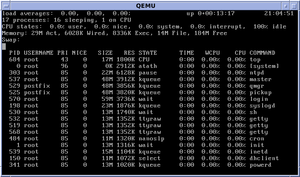NetBSD
 |
|

NetBSD 6.1 running Top, a task manager
|
|
| Developer | The NetBSD Foundation |
|---|---|
| OS family | Unix-like (BSD) |
| Working state | Current |
| Source model | Open source |
| Initial release | 1993 |
| Latest release | 7.0.2 / 21 October 2016 |
| Available in | English |
| Package manager | pkgsrc |
| Platforms | Alpha, ARM, PA-RISC, 68k, MIPS, PowerPC, SH3, SPARC, RISC-V, VAX and x86 |
| Kernel type | Modular Monolithic Anykernel |
| Userland | BSD |
| Default user interface | Command-line interface |
| License | 2-clause BSD license |
| Official website | netbsd |
NetBSD is a free and open source Unix-like operating system that descends from Berkeley Software Distribution (BSD), a Research Unix derivative developed at the University of California, Berkeley. It was the second open-source BSD descendant formally released after it forked from the 386BSD branch of the BSD source-code repository. It continues to be actively developed and is available for many platforms, including large-scale server systems, desktop systems, and handheld devices, and is often used in embedded systems.
The NetBSD project focuses on code clarity, careful design, and portability across many computer architectures. NetBSD's source code is openly available and permissively licensed.
NetBSD was originally derived from the 4.4BSD release of the Berkeley Software Distribution from the Computer Systems Research Group of the University of California, Berkeley, via their Net/2 source code release and the 386BSD project. The NetBSD project began as a result of frustration within the 386BSD developer community with the pace and direction of the operating system's development. The four founders of the NetBSD project, Chris Demetriou, Theo de Raadt, Adam Glass, and Charles Hannum, felt that a more open development model would benefit the project: one centered on portable, clean, correct code. They aimed to produce a unified, multi-platform, production-quality, BSD-based operating system. The name "NetBSD" was suggested by de Raadt, based on the importance and growth of networks such as the Internet at that time, and the distributed, collaborative nature of its development.
...
Wikipedia
